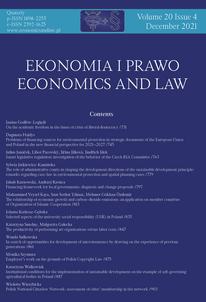On the academic freedom in the times of crisis of liberal democracy
On the academic freedom in the times of crisis of liberal democracy
Author(s): Janina Godłów-LegiędźSubject(s): Government/Political systems, Political economy, Higher Education , State/Government and Education
Published by: Wydawnictwo Naukowe Uniwersytetu Mikołaja Kopernika
Keywords: academic freedom; democracy; political economy; neoliberalism;
Summary/Abstract: Motivation: The crisis of liberal democracy reveals a new dimension to the dispute over the role of the university. Declining trust in elites and the growing uncertainty during the pandemic challenge the belief that the key aim of the university reform should be to subject it to the global mechanism of competition as well as to introduce modern management principles. In the American society, there is a growing belief that the higher education system in the United States is heading in the wrong direction and that universities are politically biased. Despite this, the American system inspires higher education all over the world, including Poland. Even during the pandemic, the attention of the academic community in Poland is focused on the lists of journals constituting the basis for the evaluation of universities and academics. Aim: The aim of the article is to demonstrate the threats posed by a higher education system governed by the dominant economic and political forces. The author evaluates the economic forces behind the parameterisation and ranking system, challenging the rationality of the Polish higher education reforms. The source of the arguments for academic freedom is the political economy that places economic goals in the perspective of longterm universal goals and examines the complex relationships between the economic, political and moral aspects. Results: Academic freedom is not a privilege of the academic world, but one of the foundations of the successful development of a democratic society because science and education cannot be subject to existing patterns of thinking and current economic and political forces. But modern universities are driven to act like firms in competitive market places and they are following trends set by short term economic and politic interests. Political economy is an effective tool for analysing functioning of higher education operating in quasi-market conditions, imposed by the dominant market players and the state. Understanding the forces underlying the reform of universities requires an analysis of the processes of interpenetration of economic and political processes, which means that the paradigm of political economy is gaining importance. In view of the requirements imposed on universities, dictated by short-term interests, the most important thing is the awareness that the necessity of state financing means that no solution will guarantee autonomy, if there is no responsibility of the academic community and self-discipline of its members
Journal: Ekonomia i Prawo. Economics and Law
- Issue Year: 20/2021
- Issue No: 4
- Page Range: 731-743
- Page Count: 14
- Language: English

